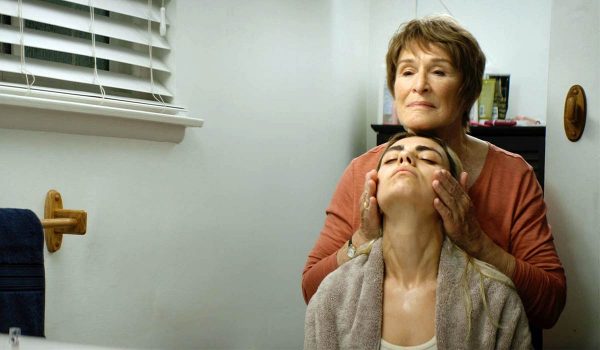Four Good Days, 2021.
Directed by Rodrigo Garcia.
Starring Mila Kunis, Glenn Close, Stephen Root, Joshua Leonard, Rebecca Field, Chad Lindberg, Michael Hyatt, and Sam Hennings.
SYNOPSIS:
A mother helps her daughter work through four crucial days of recovery from substance abuse.
Played by a disheveled and strung-out looking Mila Kunis in Four Good Days (masking inflamed gums with fake teeth), heroin addict Molly is earnest in her efforts to overcome over a decade of drug addiction sprung on by an Oxy prescription following a waterskiing injury at age 17. After a detox stint, her former partner Sean (Joshua Leonard), who has his own battles with painkillers, stops by with their children for support. During that visitation, Molly plays video games with her children and loses, prompting the kid to repeat over and over, “you suck,” jokingly. To us, it’s a young boy goofing around with his mom, but as he keeps repeating the phrase, it becomes a reminder of her mistakes and the shame she outwardly bears. Looking on in the background is her mother Deb (Glenn Close, handling the boisterous melodrama with a balance of optimism and cynicism regarding her daughter’s chances of recovering for good), wearing the facial expressions of fear that Molly may lose it and verbally snap at her own child due to the trash talk hitting too close to home.
Mila Kunis has delivered one of her finest performances (it’s especially her best work since Black Swan) here in Four Good Days. Her body language during the aforementioned scene serves as one of a handful of emotional moments. Another sees her take up an opportunity to spread awareness about drug addiction in front of a class of teenagers, all despite having a fear of public speaking. This talk eventually sees her breaking down and apologizing to her mother for robbing loved ones of not only materialistic possessions (of course, to sell and purchase drugs with) but robbing them of aspects of their own lives while once again projecting shame over degrading herself in the name of scoring heroin.
Co-written and directed by Rodrigo Garcia (who previously coached Glenn Close to an Oscar nomination in Albert Nobbs), whenever Four Good Days focuses on the escalating tension and the understandable lack of trust Deb has for Molly, it’s riveting and raw. For every glimmer of hope Deb shows that Molly is really going to turn things around this time (she has been to detox at least 17 times already), there is also a refusal to fully give into that positivity, monitoring her like a toddler and rushing home upon realizing she left her purse at home.
The history between their fractured relationship also extends beyond Molly’s addiction, including Deb flat out abandoning her on the verge of adulthood due to needing to escape a toxic and abusive marriage. Needless to say, even when Deb tries her hardest to resist helping Molly, knowing full well the result is likely never going to change and that only Molly can overcome the addiction, there’s an undercurrent of guilt that she turned out this way. Deb’s current partner Chris (Stephen Root), is usually there, encouraging her not to cave and offer help, knowing that it will once again end with hurt.
For about an hour, Four Good Days is actually quite good, sticking with Deb and Molly, who have the common goal of keeping the latter clean during the titular four day period, which is when the necessary insurance paperwork will go through, allowing for a monthly opiate antagonist which will eliminate all cravings. Unfortunately, the screenplay (also written by Eli Saslow, which is also adopted from an article in the Washington Post about a similar mother and daughter dynamic) stumbles into clichés and contrivances of the genre. Soon, everyone in the movie is screaming and yelling at each other, which both damages the characterization of all involved and takes away from Mila Kunis’ outstanding work and Glenn Close, although to a lesser extent.
One character says Deb always did have a flair for the dramatic, but really, Four Good Days suffers from that problem. It starts as something authentically absorbing transitions into mawkishness. Also, the condemnation for the American healthcare system comes too late without feeling earned. Still, Mila Kunis and Glenn Close keep things grounded with heart-wrenching turns that feel real more than they don’t.
Flickering Myth Rating – Film: ★ ★ ★ / Movie: ★ ★ ★
Robert Kojder is a member of the Chicago Film Critics Association and the Critics Choice Association. He is also the Flickering Myth Reviews Editor. Check here for new reviews, follow my Twitter or Letterboxd, or email me at MetalGearSolid719@gmail.com














